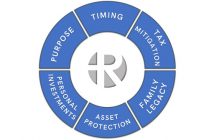Not Too Hot, Not Too Cold — Just Right
I find it still hard to believe that 2018 is upon us. Unlike last winter, the weather has been tame but the markets have not been. 2017 saw a remarkable smooth ride to strong portfolio returns. Let’s begin by discussing the following topics that may prove important to your portfolio strategies in 2018. This includes:
1. Fourth Quarter and Full Year Market Review
2. The Impact of the Recently-Passed Tax
Reform Legislation
3. A Look Ahead for 2018
1. Fourth Quarter and Full Year Market Review
Every major index, whether representing stocks, bonds or commodities recorded a positive return for the fourth quarter. For the fourth quarter, stock index leaders included:
• S&P 500 Growth +6.8 percent
• S&P 500 +6.6 percent
• S&P 500 Value +6.3 percent
• S&P 400 Mid-Cap +6.3 percent
• S&P North American Natural Resources +5.9 percent
• Emerging Markets +6.7 percent,
• Small Cap International +6.0 percent.
During Q4, the Federal Reserve began slowly unwinding its massive $4.4 trillion investment in bonds, raised its Fed Funds rate twice (to 1.25 percent-1.50 percent) and indicated at least two additional Fed Funds rate increases were likely in 2018. The yield on the U.S. Treasury 10-year bond rose slightly from 2.33 percent in September to 2.40 percent during Q4. Nonetheless, the Barclay’s U.S. Aggregate Bond index returned a positive 0.4 percent for the quarter AND Barclay’s U.S. TIPS index did slightly better at +1.3 percent.
Full year 2017 market returns were very good. As often happens from year to year, domestic stock index relative gains were ranked in the opposite order of the prior year. Clearly, investments in U.S. stock indexes benefitted from rising earnings, optimistic investor sentiment and low perceived risks of rising inflation or an economic recession. The biggest winners were the large cap technology stocks such as the FAANG (Facebook, Apple, Amazon, Netflix, Google) Here’s how some of the main indexes performed in 2017:
• The S&P 500 total return was +21.8 percent
• S&P MidCap +16.2 percent
• S&P SmallCap +13.2 percent
• S&P 500 Growth +27.4 percent
• S&P Value +15.3 percent.
With the weakness of the U.S. Dollar and better earnings growth, international stock index gains exceeded even the strong S&P 500 gains.
• Emerging Markets (EM) returned +31.5 percent
• FTSE Small Cap International +29.9 percent
• FTSE All World ex-U.S. +27.1 percent.
The 2017 Barclay’s U.S. Aggregate Bond index return was 3.5 percent and 10-year U.S. Treasury bond yields were essentially flat at 2.40 percent versus 2.45 percent at yearend 2016. The continued search for yield and improving investor confidence in the global economy resulted in fixed income leadership from
the following:
• Emerging Markets +14.7 percent
• Investment grade U.S. corporates +7.3 percent
• U.S. High Yield sector +6.3 percent
2. Impact of the Recently-passed Tax Reform Legislation
Congress passed a comprehensive tax reform bill in December which generally became effective on January 1, 2018. Tax rates were cut across the board, which is positive for all taxpayers, but the reform should help high income filers the most. According to Pew Research, in 2015, people making less than $50,000 accounted for 61.4 percent of all returns filed, but paid just 5.4 percent of all income taxes. People making greater than $200,000 per year accounted for 4.5 percent of tax filings, but paid 58.9 percent of all income taxes. Looking at these numbers from a mathematical perspective shows those who pay the most in taxes are likely to see the most benefit. As with all complicated legislation, people will receive benefits from certain changes, while possibly seeing disadvantages in other areas. I encourage you to talk to your tax professional for more information regarding the net benefit to your personal situation.
The larger immediate impact on the economy and markets comes from the long-overdue reduction in the corporate tax rate. Since 1993, the top U.S. corporate tax rate has been one of the highest in the world at 35 percent which gave companies a strong financial incentive to move jobs, production and even corporate headquarters overseas. Now the tax rate is 21 percent and business investment expenses may be fully expensed rather than depreciating over a period of years. The consensus expectation is that these new incentives to invest and add jobs in the U.S. will lead to greater capital spending and faster income growth. S&P 500 earnings per share should be boosted and we will monitor earnings estimate revisions and quarterly growth rates to see if this takes place.
Anticipation of the passage of tax reform was clearly a positive for investor, business and individual sentiment surveys in 2017 and was a factor in higher stock market valuations. We are optimistic that the reality of tax reform will be a positive for the stock market in 2018.
3. A Look Ahead for 2018
Nearly every economic outlook we have read, from the Fed to Wall Street to independent forecasters reflect optimism about global GDP growth this year. They are not too worried about central bank actions and expect inflation to remain low. As noted earlier, the impact of U.S. tax reform is expected to boost consumer incomes, business spending and corporate earnings. If these views prove correct, 2018 will be a Goldilocks year (not too hot, not too cold – just right) for not only the U.S. economy but also for developed and emerging economies around the world. If not, disappointed investors may turn to taking some of their gains off the table.
We also must note investor complacency could be shaken if attention turns to the growth impact of negative factors such as the highly volatile global political environment, terrorism, extreme weather events, and above-average market valuations. Another wild card might be if the air suddenly came out of the crypto currency bubble. The Chinese philosopher, Confucius stated: “May you live in interesting times.” That we most certainly do! Make it a great 2018.
David Rosell is president of Rosell Wealth Management in Bend. www.RosellWealthManagement.com. He is the author of Failure is Not an Option- Creating Certainty in the Uncertainty of Retirement and his latest book Keep Climbing — A Millennial’s Guide to Financial Planning. Learn more about his books at www.DavidRosell.com. Ask for David’s book at Newport Market, Cafe Sintra, Bluebird Coffee Shop, Dudley’s Bookshop, Roundabout Books, Sunriver Resort, Barnes & Noble and online at Amazon.com





